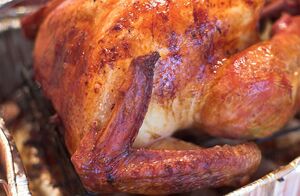Traditional Farmfresh Turkey
Traditional Farmfresh Turkey

Traditional Farmfresh Turkey (English version of the name only) has EU TSG protection. The turkeys are grown to a minimum age of 18 weeks in open or protected barns with or without free range. The maximum stocking density is as follows:
- 25 kg per m2 for open barns/pole barns with natural ventilation only
- 35 kg per m2 for protected barns with natural ventilation and powered ventilation
From eight weeks of age turkeys must be housed in buildings which are both naturally lit and ventilated, and giving proper protection against the extremes of weather. Bedding must be a deep-litter of freshly topped-up straw or softwood shavings. The free range version must also have daytime access to open air runs in an area mainly covered by vegetation of at least 4m2 per bird. Turkeys are fed on a diet containing only vegetable protein from the age of six weeks. From 10 weeks of age 70% of the diet must consist of cereals. Unless prescribed by a veterinary surgeon on animal welfare grounds, antibiotics or growth promoters are not fed to turkeys. 12 to 15 hours prior to slaughter, food (but not water) is withdrawn from the turkeys. They are then killed close to where they were reared using electrical stunning and bleeding or neck dislocation. The carcases are then hand or machine dry plucked before being hung by both legs for 7 to 14 days in a ventilated facility at a maximum temperature of 4C.
The slow growth of the birds results in a good carcase with firm meat. The method of hanging ensures tenderness of meat and development of a strong or gamey flavour which increases according to length of time the carcases are hung. They are sold whole bodied or eviscerated. Good developed carcase with full fat cover. ADAS inspectors visit the premises of the producer annually to check production specification as detailed above. Further inspections are undertaken at random.
Reference: The European Commission